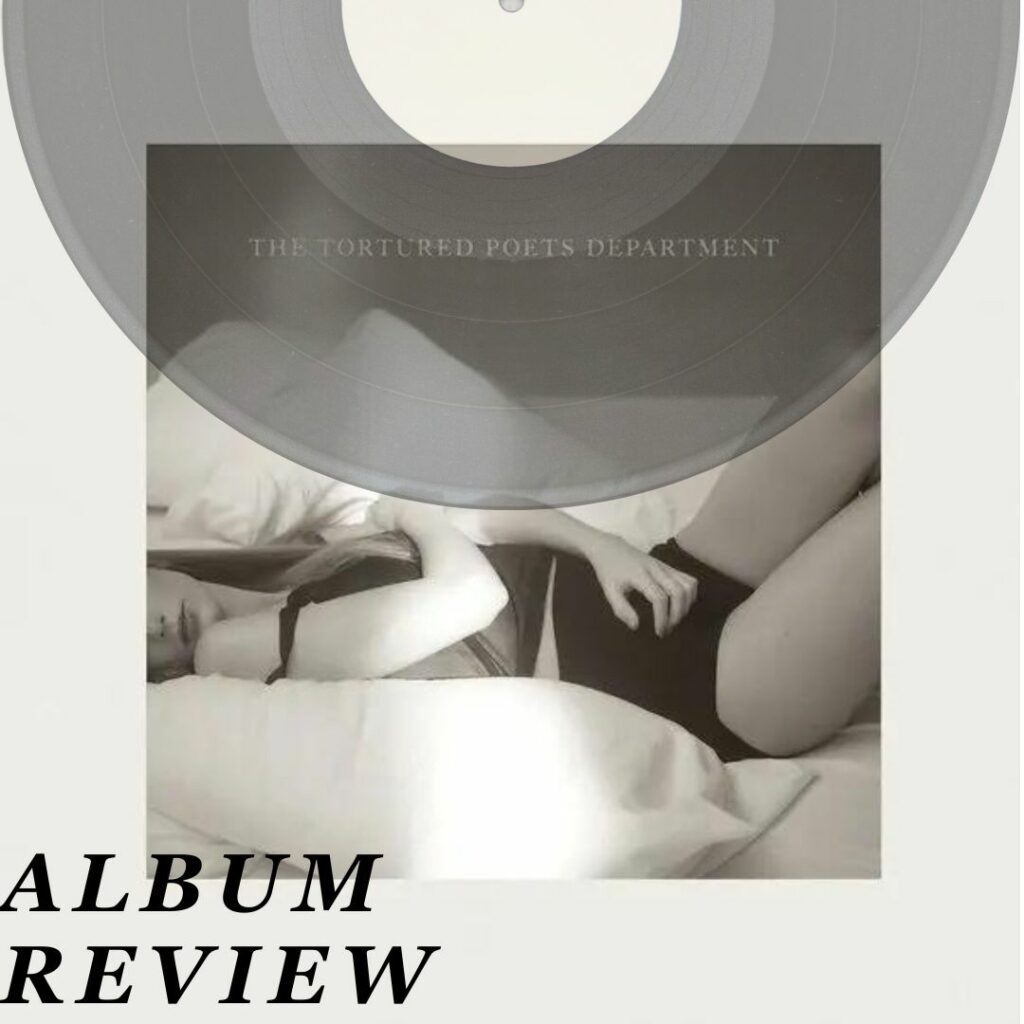
Taylor Swift released “THE TORTURED POETS DEPARTMENT” on April 19, marking her 11th studio album and first double-album effort. At 2 a.m., the singer surprise dropped an additional 15 songs for “THE ANTHOLOGY,” which brought the tracklist up to 31.
“Fortnight (feat. Post Malone)” was the first taste I got of “THE TORTURED POETS DEPARTMENT.” The production, courtesy of Swift’s long-time collaborator Jack Antonoff, has a percussive and synth-like quality.
The song sets up a recurring motif in the album: a smiling face can mask a broken heart. “I love you, it’s ruining my life,” Swift sings with a slight constriction of her throat — disillusioned, yet stoic. This love is suburban bliss. However, beneath these manicured lawns, there is tension, and the love begins to erode.
The title track takes a sharp detour from the opener’s eerie minimalism. Lyrically, it is Swift at her most unhinged. One second, she raises an eyebrow at her highbrow partner. The next, she vows to never leave him.
Swift presents an allegory in “My Boy Only Breaks His Favorite Toys” where she is a coveted doll who retaliates against her partner with the fervency of a child — she holds him accountable for continued abrasion. The cinematic, punchy “Down Bad” sees her sweating off this old lover. However, she does not leave the gym weightless: “Like I lost my twin / F*** it if I can’t have him.”
The fifth track “So Long, London” is a standout. Its pulsating beat functions as a sonic representation of Swift’s anxiety. She instills the word “London” with dual meaning, referencing both the city and person she is leaving. “You swore that you loved me, but where were the clues? / I died on the altar waiting for the proof,” she questions. By the end of this song, I was just another poignant lyric away from crying.
The cutting ballad “loml” ultimately brought me to tears. The song is steeped in free-verse poetry, which is stifled and emotionally elevated by Aaron Dessner’s production. Swift has so much to share, yet the subject of her sorrow — the very person she is confiding in — does not give her attention, exposing a flaw in their relationship that led them to this point.
In my mind, “Fresh Out The Slammer” is the follow-up to “The Great War” (2022), a song of painful revelation where Swift breaks free of a haze. With the crackling fires of war behind her, she emerges as a free woman. Similarly, “Florida!!! (feat. Florence + The Machine)” emanates a psychedelic sense of liberation. As Swift sings, this track is indeed “One hell of a drug” thanks to Florence Welch’s hypnotizing vocal contribution.
“I Can Fix Him (No Really I Can)” and “I Can Do It With a Broken Heart” go hand-in-hand. Preceded by “loml,” “I Can Do It With a Broken Heart” marks the beginning of her gradual shift away from the past. The result is a sprawling pick-me-up anthem where Swift forces a smile until it comes naturally. Seeing clips of “The Eras Tour” as the song’s canvas on Spotify warmed my heart — “Try and come for my job,” she jokes about her celebrity status.
On “The Smallest Man Who Ever Lived,” however, Swift exhibits raw humanity. She has made tremendous progress, but is still susceptible to relapse: “Were you writing a book? Were you a sleeper cell spy? / In 50 years, will all this be declassified?”
The album wraps up with a reset. “The hospital was a drag,” Swift scoffs on “The Alchemy.” Such a transformation is then perfectly underscored by the lyrics in “Clara Bow,” the final track of the standard edition — “You look like Taylor Swift / … The future’s bright / Dazzling.”
“THE TORTURED POETS DEPARTMENT” not only expands Swift’s musical repertoire but also serves as a consolidation of her storytelling craft. My favorite songs, with the exception of “Guilty as Sin?” — an amalgamation of all Swift did right on “evermore” (2020) — are the lengthiest on the album. “But Daddy I Love Him” and “Who’s Afraid of Little Old Me?” sit above five and a half minutes and are utterly savage, harnessing the theatricalism she perfected on “Speak Now” (2010). Here, Swift is more daring and artistically-fulfilled than ever before, masterfully blending all her strengths into a cohesive and captivating whole.









